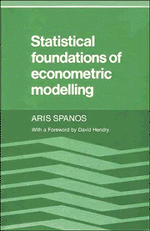Book contents
- Frontmatter
- Contents
- Foreword by David Hendry
- Preface
- Acknowledgements
- List of symbols and abbreviations
- Part I Introduction
- Part II Probability theory
- Part III Statistical inference
- Part IV The linear regression and related statistical models
- 17 Statistical models in econometrics
- 18 The Gauss linear model
- 19 The linear regression model I – specification, estimation and testing
- 20 The linear regression model II – departures from the assumptions underlying the statistical GM
- 21 The linear regression model III – departures from the assumptions underlying the probability model
- 22 The linear regression model IV – departures from the sampling model assumption
- 23 The dynamic linear regression model
- 24 The multivariate linear regression model
- 25 The simultaneous equations model
- 26 Epilogue: towards a methodology of econometric modelling
- References
- Index
26 - Epilogue: towards a methodology of econometric modelling
Published online by Cambridge University Press: 01 June 2011
- Frontmatter
- Contents
- Foreword by David Hendry
- Preface
- Acknowledgements
- List of symbols and abbreviations
- Part I Introduction
- Part II Probability theory
- Part III Statistical inference
- Part IV The linear regression and related statistical models
- 17 Statistical models in econometrics
- 18 The Gauss linear model
- 19 The linear regression model I – specification, estimation and testing
- 20 The linear regression model II – departures from the assumptions underlying the statistical GM
- 21 The linear regression model III – departures from the assumptions underlying the probability model
- 22 The linear regression model IV – departures from the sampling model assumption
- 23 The dynamic linear regression model
- 24 The multivariate linear regression model
- 25 The simultaneous equations model
- 26 Epilogue: towards a methodology of econometric modelling
- References
- Index
Summary
A methodologist's critical eye
The purpose of this chapter is to formalise the methodology sketched in Chapter 1 using the concepts and procedures developed and discussed in the intervening chapters. The task of writing this chapter has become considerably easier since the publication of Caldwell (1982) which provides a lucid introduction to the philosophy of science for economists and establishes the required terminology. Indeed, the chapter can be seen as a response to Caldwell's challenge in his discussion of possible alternative approaches to economic methodology:
…One approach which to my knowledge has been completely ignored is the integration of economic methodology and philosophy with econometrics. Methodologists have generally skirted the issue of methodological foundations of econometric theory, and the few econometricians who have addressed philosophical issues have seldom gone beyond gratuitous references to such figures as Feigl or Carnap.…
(See ibid, p. 216.)In order to avoid long digressions into the philosophy of science the discussion which follows assumes that the reader has some basic knowledge of philosophy of science at the level covered in the first five chapters of Caldwell (1982) or Chalmers (1982).
Let us begin the discussion by considering the textbook econometric methodology criticised in Chapter 1 from a philosophy of science perspective. Any attempt to justify the procedure given in Fig. 1.1 reveals a deeply rooted influence from the logical positivist tradition of the late 1920s early 30s.
- Type
- Chapter
- Information
- Statistical Foundations of Econometric Modelling , pp. 659 - 672Publisher: Cambridge University PressPrint publication year: 1986



